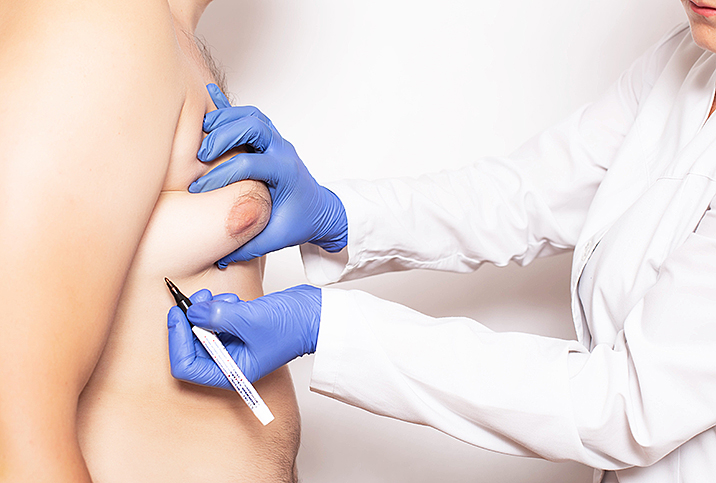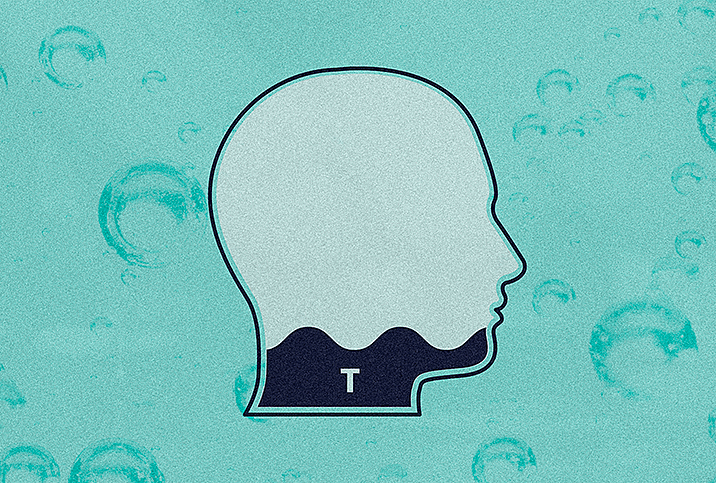An Introduction to Gynecomastia & Its Link to ED

Gynecomastia, the medical term for male breast enlargement, can make a man feel extremely self-conscious and also affect his libido, or even cause erectile dysfunction (ED). Knowing what causes gynecomastia and understanding the link between this condition and ED can give men insight into how to improve their sex life and achieve greater well-being.
Generally defined as any type of breast enlargement in men, gynecomastia is a noncancerous excess of male breast-gland tissue that an estimated 30 percent of males will experience at least once in their life, according to a study. Men with this condition usually have swollen, enlarged breasts that resemble a female’s.
Gynecomastia usually isn’t life-threatening, but it can contribute to low self-esteem, depression, emotional distress and reduced quality of life. If you have gynecomastia, you have a hormone imbalance, and that could affect your sex life.
What causes gynecomastia?
The primary cause of gynecomastia is low testosterone. Critical to helping men develop and maintain masculine features such as a deep voice, body hair and muscle mass, testosterone naturally decreases as men age. However, testosterone levels can be increased and maintained by practicing certain healthy lifestyle behaviors, such as exercising regularly and not abusing drugs.
Testosterone and estrogen are present in both men and women; however, men typically have higher levels of testosterone, while women typically have higher levels of estrogen. If a man’s testosterone levels are significantly low in proportion to his estrogen levels, he may start taking on women’s physical characteristics, such as enlarged breasts. Having gynecomastia may slightly increase a man’s risk of breast cancer due to a change in the ratio of estrogen to testosterone in the body, according to the Mayo Clinic.
Gynecomastia can be caused by any factor that contributes to low testosterone and hormone imbalances, including the following:
-
Andropause (male menopause)
-
Puberty
-
Weight gain and obesity
-
Lack of sleep
-
Lack of exercise
-
Drug and alcohol abuse
-
Steroid use
-
Damage or injury to the testes
-
Liver or kidney problems
-
Hyperthyroidism
-
Testicular tumors
-
Cancer treatments, such as chemotherapy or radiation therapy
What is the link between gynecomastia and ED?
Many men who suffer from gynecomastia also suffer from erectile dysfunction as a result of low testosterone, which is the main driver behind desire and libido. Men need high levels of testosterone to achieve an erection, experience ejaculation and produce healthy semen.
Gynecomastia may indirectly cause ED because of the way it can affect confidence and self-esteem. Men with this condition may feel embarrassed or self-conscious about their chest and avoid intimacy and other situations that require them to remove their shirt. Anxiety and stress related to gynecomastia can prevent them from enjoying many activities, including sex.
Patients with gynecomastia more frequently report sexual complaints, such as severe erectile dysfunction, lower sexual desire and intercourse frequency, orgasm difficulties, delayed ejaculation and lower ejaculate volume, according to a 2014 study found in the National Library of Medicine.
Can gynecomastia and ED be improved at the same time?
Men with gynecomastia and erectile dysfunction can improve both of these conditions by practicing healthy behaviors that raise testosterone levels and/or addressing the root causes of one or both conditions. For instance, men who are overweight and physically inactive can start exercising regularly. Men who abuse steroids, alcohol and other drugs can get professional substance abuse treatment to overcome their dependency and correct related hormone imbalances.
If low testosterone is an issue, men can speak with their doctor about hormone replacement therapy (HRT), which can increase testosterone levels. HRT is available in the form of injections, patches and topical gels.
Underlying medical conditions, such as liver failure and cancer, that contribute to gynecomastia and ED can be treated, so men should talk to their doctor about treatment plans.
Gynecomastia, while relatively rare and non-life-threatening, can take a mental toll on men, especially when combined with the stress of suffering from erectile dysfunction. In many instances, however, treating the root causes may eventually lead to the resolution or improvement of both gynecomastia and ED.

















